Search the Special Collections and Archives Portal
Search Results

Warren A. Bechtel Album of Hoover Dam: photographic print
Date
Description

Warren A. Bechtel Album of Hoover Dam: photographic print
Date
Description

Letter from Walter R. Bracken (Las Vegas) to Fred Knickerbocker (Los Angeles), October 14, 1924
Date
Archival Collection
Description
The temporary expedients they used to bring the new well into production, like the makeshift settling pond, needed to be permanently settled before the state and county health authorities got involved. The office of Mr. Osborne and Engineer McKee is mentioned.
Text

Meeting minutes, Committee selected to consider question of Railroad Company obtaining water for railroad facilities at Las Vegas, Nevada, by using shop well, March 4, 1952
Date
Archival Collection
Description
Minutes of a meeting to discuss whether the Los Angeles & Salt Lake Railroad Co. had a vested water right in Well No. 1 and the flow that would be required from the shop well to meet the railroad's requirements.
Text
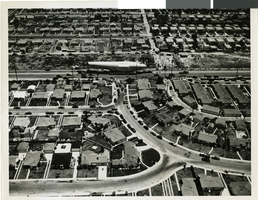
Photograph of the hull of the Hughes Flying Boat being transported from Culver City to Terminal Island, California, 1946
Date
Archival Collection
Description
Image
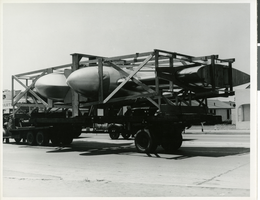
Photograph of engine parts of the Hughes Flying Boat being moved to Terminal Island, Los Angeles Harbor, 1946
Date
Archival Collection
Description
Image
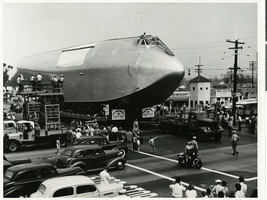
Aerial photograph of the fuselage of the Hughes Flying Boat being moved to the Los Angeles Harbor, 1946
Date
Archival Collection
Description
Image
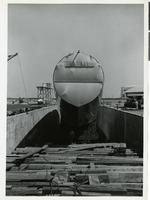
Photograph of a Flying Boat section being placed at dock, June 15, 1946
Date
Archival Collection
Description
Image
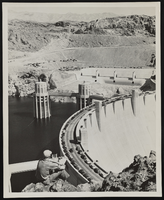
Photograph of Hoover Dam with cars lining road, Boulder City (Nev.), 1940s
Date
Archival Collection
Description
Image
Jim Clinton oral history interview, 2024 October 08
Level of Description
Scope and Contents
Oral history interview with Jim Clinton conducted by Claytee D. White and Stefani Evans on October 8, 2024 for the UNLV Remembers: an Oral History of the 6 December 2023 Shootings project. In this interview, Clinton, UNLV's Associate Vice President of Finance and Operations in the Department of Philanthropy and Alumni Engagement, recalls the events of December 6. He recalls being in the Foundation Building but cannot recall how the staff became aware of the shooting, because their cell phones did not work; they could neither next nor receive texts. Once he was made aware, he went to the front, secured the building, and began to account everyone. He gathered the staff into two conference rooms to make sure the team was protected and that any students had snacks and water. Eventually, police evacuated the building and sent everyone to the Thomas & Mack Center. There, Clinton saw only disorganization; no one seemed to know where to tell them to go. They decided to walk back across campus to get their cars to go home; they saw police everywhere, including some police interrogating a man who looked "out of place," but they allowed the group to continue. Those who were parked in the Cottage Grove parking structure could not access their cars, so those who had parked in Lot Y took their colleagues home. His cell phone connectivity problems meant that Clinton had not spoken to his wife until he returned home that evening. The next day, his wife helped him and his colleagues retrieve their cars and their belongings. He credits Sherandra Owen, Associate Director of IT and Facilities, for making sure the team were able to access the building and their belongings without having to go through the police. His experience with Bridge Counseling led him to reach out to his colleagues to suggest their services. In the interview, he reflects on how the events of December 6 bonded his team closer together. Digital audio and transcript available.
Archival Collection
Collection Name: UNLV Remembers: an Oral History of the 6 December 2023 Shooting interviews
Box/Folder: Digital File 00 (Restrictions apply)
Archival Component
